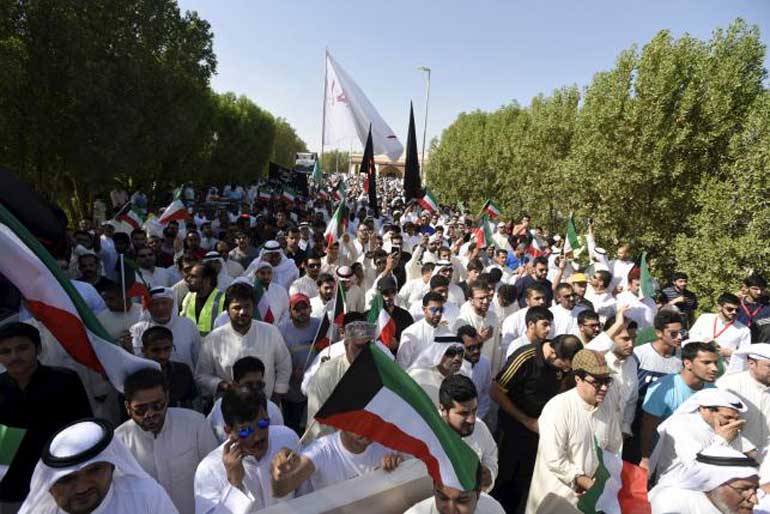Tuesday Feb 17, 2026
Tuesday Feb 17, 2026
Monday, 29 June 2015 00:00 - - {{hitsCtrl.values.hits}}

Mourners hold flags as the bodies of victims of Friday's bombing are buried in Al Jafariya cemetery in Suleibikhat, Kuwait - REUTERS
Kuwait detained the owner of a car that took a bomber to a Shi’ite mosque to carry out the country’s worst ever militant attack, officials said on Saturday, as thousands calling for national unity turned out to bury some of the 27 killed.
Militant group Islamic State claimed responsibility for the suicide bombing against 2,000 worshippers praying at the Imam al-Sadeq mosque on Friday, one of three attacks on three continents that day apparently linked to hardline Islamists.
In Tunisia, a gunman killed 37 people including Western tourists on a beach, and in France a decapitated body was found after an attacker rammed his car into a gas container, triggering an explosion.
Officials said the bombing was clearly meant to stir enmity between majority Sunnis and minority Shi’ites and harm the comparatively harmonious ties between the sects in Kuwait.
In a statement, the information ministry said Kuwait would faced the situation with “unity and solidarity”. It reiterated what it called the government’s strong stance on the freedom of religion and opinion, noting these were rights protected by the constitution.
The interior ministry, which reported the vehicle owner’s arrest, said it was now looking for the driver who vanished shortly after Friday’s blast in Kuwait, which has been spared the rampant violence of neighbouring Iraq and the recent spate of Islamic State bombings of Shi’ite mosques in Saudi Arabia, another neighbour.
A security source told Reuters “numerous arrests” had been made in connection with Friday’s bombing.
At the burial site in the Sulaibikhat district, some waved Kuwaiti flags while others bore the large mourning banners, in red, black or green, that are typical of Shi’ite funerals.
Chants from the crowd included “Brothers of Sunni and Shia, we will not sell out our country,” “No Sunni, no Shia, we are one Islam”, “The martyrs are the beloved of God” and “Down with Daesh! Down with Daesh”, an acronym for Islamic State.
One group of mourners said they had travelled from Qatif in Saudi Arabia where 21 people were killed by an Islamic State suicide bombing in May.
Two Iranian nationals were among those killed, foreign ministry spokeswoman Marzieh Afkham was quoted as saying by Iranian state media on Saturday.
Relatives of seven of those killed wept and prayed over their shrouded corpses at a mosque on Saturday, where they were waiting to be taken to the Shi’ite holy cities of Najaf and Karbala in Iraq for burial.
Oil security stepped up
Shi’ites are between 15 and 30 percent of the population of Kuwait, a mostly Sunni country where members of both communities live side by side with little apparent friction.
“We will cut the evil hand that interferes with our homeland’s security,” Interior Minister Sheikh Mohammed al Khaled al Sabah was quoted as saying by state news agency KUNA.
Kuwait has stepped up security to the highest level at state-run oil conglomerate Kuwait Petroleum Corp (KPC) and its affiliates, KUNA also reported.
Islamic State named the bomber as Abu Suleiman al-Muwahed and said on social media that he had targeted a “temple of the apostates” – a term the group uses to refer to Shi’ites, whom it regards as heretics. It did provide details of his nationality.
Islamic State had urged its followers on Tuesday to step up attacks during the Ramadan fasting month against Christians, Shi’ites and Sunni Muslims fighting with a U.S.-led coalition against the ultra-hardline jihadist group.
There was no evidence Friday’s three attacks were deliberately coordinated. But coming so close together, they underscored the far-reaching, fast-growing influence of Islamic State, Western politicians said.